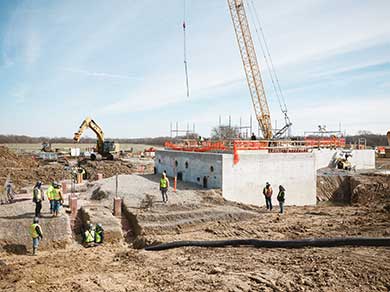Rise of Off-Site Construction
Modern construction techniques increasingly allow for significant portions of construction work to be completed off-site, delivering benefits for developers, contractors, and the public. Prefabrication strategies enable project managers to plan and produce infrastructure components in controlled environments, then transport them to the project site based on feasibility, cost, and logistics.
The benefits are significant and measurable. Project schedules can be shortened by months through the implementation of simultaneous construction activities. These off-site construction methods can also remove waiting periods, such as the typical 28-day concrete curing cycle, before proceeding to the next construction phases.
Off-site construction reduces waste through formwork reuse and lowers concrete volume requirements via revised reinforcement specifications. Safety improves as well, with components built in controlled environments reducing on-site hazards for both construction workers and the public.
Surge in Stadium Projects
In 2025 alone, over 300 stadium projects are underway globally, ranging from professional football stadiums to future Olympic venues. These investments go far beyond sports; they include major infrastructure upgrades and community enhancements, often spurring local economic growth.
The new Nissan Stadium project underway in Nashville exemplifies this trend. Originally considered for renovation, a financial analysis revealed that a $1.8 billion renovation would be less cost-effective than a $2.1 billion new build. This shift supports broader urban development aligned with Nashville’s East Bank Vision Plan, covering nearly 300 acres of mixed-use redevelopment. RaganSmith, a Pape-Dawson company, is providing civil engineering and surveying & geospatial services for the project.
Despite being just 75 feet from the still-operational existing stadium, the project has moved forward with innovative solutions. Challenges such as underground utility relocation and complex scheduling have been resolved using advanced technology and multidisciplinary collaboration.
LiDAR surveys have produced detailed spatial data of the existing stadium, while building information modeling (BIM) supports both surface and subsurface analysis, demonstrating how high-tech tools are shaping modern civil engineering practices.
Strategic Environmental Planning
Not all high-impact projects make headlines. Increasingly, civil engineering initiatives are focused on environmental integration and improving community access to natural resources.
The Tennessee Blueways initiative, led by RaganSmith, illustrates how civil engineering can support both conservation and community engagement. The 5-year implementation strategy for this initiative aims to enhance recreational river corridor accessibility across 15 river systems through a systematic approach that includes inventory, analysis, stakeholder input, and implementation. In addition to this project in Tennessee, as a civil engineering company in Jacksonville, Florida, and other markets across the Southwest, Pape-Dawson is supporting conservation efforts for other communities.
Rivers are cultural and ecological assets. This initiative seeks to preserve their unique characteristics while promoting recreational use, improving quality of life, and creating new economic development opportunities.
Advancements in Surveying Technology
Surveying has undergone a technological revolution, forming the foundation for many of today’s design and construction innovations. From 3D laser scanning mobile and aerial LiDAR, to photogrammetry, terrestrial scanning, and unmanned aerial systems, data collection is more efficient and detailed than ever.
These tools produce highly accurate spatial data, streamlining everything from stadium planning to river enhancement projects. Pape-Dawson’s survey and GIS services from Texas to Florida lead the way, utilizing their knowledge to combine conventional surveying methods with newer technology to deliver precise boundary, topographic, and construction layout surveys, improving project efficiency and flexibility to meet project needs and timelines as a leading civil engineering company in Orlando and other cities.
About Pape-Dawson
As a trusted national civil engineering company, Pape-Dawson demonstrates an unwavering commitment to excellence throughout project lifecycles, from conceptual development through implementation. Our professional teams across Orlando, Jacksonville, and throughout our national presence are dedicated to designing infrastructure and communities that address contemporary requirements while incorporating future considerations. Partner with Pape-Dawson Engineers on your next project to create a meaningful and sustainable impact.
